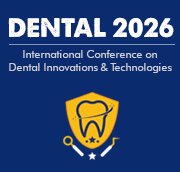Digital Dentistry and Robotics Innovations
Digital dentistry and robotics are revolutionizing the field of oral health, introducing a new era of precision, efficiency, and patient comfort. Digital tools such as intraoral scanners, CAD/CAM systems, and 3D imaging allow for faster, more accurate diagnoses and treatment planning. These innovations ensure that procedures like crowns, bridges, and implants are designed with high precision, reducing the need for multiple visits. Robotics, particularly in surgery, enhances the accuracy of complex procedures like dental implants, with robotic arms that perform movements with greater precision than a human hand. Together, these technologies streamline workflow, minimize human error, and improve overall patient outcomes. As these technologies continue to evolve, they promise even greater advancements in preventive care and patient satisfaction.

David Geoffrey Gillam
Queen Mary University of London, United Kingdom
Zvi Loewy
New York Medical College, United States
Khamis A Hassan
Global Dental Research Centre, Canada
Laurindo Moacir Sassi
Erasto Gaertner Hospital Cancer Center and Mackenzie Evangelical University Hospital, Brazil
Arnaldo Castellucci
Dr. Castellucci MD, DDS, Italy
Yasser Khaled
Marquette University, United States



Title : Efficacy of a biomin F toothpaste compared to conventional toothpastes in remineralisation and dentine hypersensitivity: An overview
David Geoffrey Gillam, Queen Mary University of London, United Kingdom
Title : Knowledge and attitudes of dental professionals in the evaluation of Molar Incisor Hypomineralisation (MIH): Awareness, diagnosis and treatment approaches: An overview
David Geoffrey Gillam, Queen Mary University of London, United Kingdom
Title : Innovative approaches to impede the pathogens implicated in COPD exacerbation
Zvi Loewy, New York Medical College, United States
Title : Enhancing root canal success strategic use of orifice opener one step synthesis gels orifice barriers
Emmanuel Samson, Consultant Total Dental Care, India
Title : The coordinated triad of spatial temporal and biomechanical strategies managing the where when and how of shrinkage stress in bulk fill resin composite restorations
Khamis A Hassan, Global Dental Research Centre, Canada
Title : Importance of clinical pharmacokinetics of medications in the postoperative period of patients undergoing dental surgical procedures
Vitoldo Antonio Kozlowski Junior, Ponta Grossa State University, Brazil